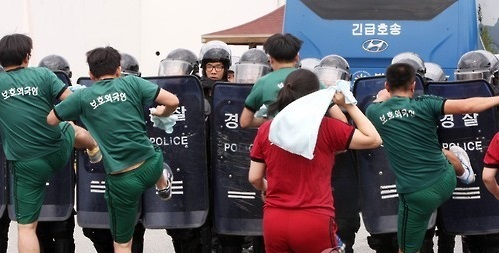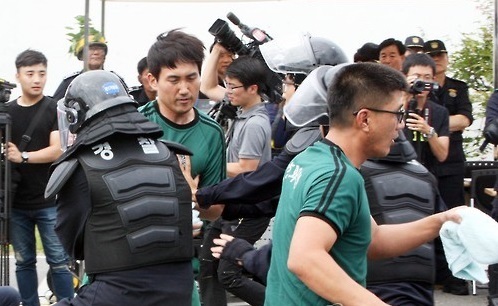On Jan. 5, three immigration officers were booked on charges of assaulting a foreign detainee at Cheongju Detention Center, rekindling concerns over the level of human rights protection at such facilities in Korea.
The police launched a probe into the case of a 33 year-old Uzbek man, who claimed he was choked and assaulted by three detention center guards on Sept. 25 when he asked for medical treatment outside the facility.
“I had a chronic headache for seven to eight months, but the medicine I was provided with did not work ... so I went to the in-house doctor and requested for a permit to go to a bigger hospital outside for a treatment,” Mamadiev Komil, who was an illegal migrant, said in his police statement obtained by The Korea Herald. “The doctor refused, saying I do not have any headache.”
According to his testimonies and two other witnesses at the scene, detention center guards forcibly dragged Komil out of the doctor’s office, beating him in the chest and face on multiple occasions. He was allegedly strangled and threatened with a tear gas gun.
The police launched a probe into the case of a 33 year-old Uzbek man, who claimed he was choked and assaulted by three detention center guards on Sept. 25 when he asked for medical treatment outside the facility.
“I had a chronic headache for seven to eight months, but the medicine I was provided with did not work ... so I went to the in-house doctor and requested for a permit to go to a bigger hospital outside for a treatment,” Mamadiev Komil, who was an illegal migrant, said in his police statement obtained by The Korea Herald. “The doctor refused, saying I do not have any headache.”
According to his testimonies and two other witnesses at the scene, detention center guards forcibly dragged Komil out of the doctor’s office, beating him in the chest and face on multiple occasions. He was allegedly strangled and threatened with a tear gas gun.

“They swore at me and said I should go back home. They then pushed me down the stairs and aimed a gun at me, asking me whether I wanted to be killed,” Komil said. “I sustained bruises and scars on my neck and arms.”
The immigration officers have denied the charges, according to police. The Justice Ministry said it also doubted the victim’s testimonies, but said it would take measures in accordance with the result of police investigation.
Allegations of physical and verbal abuses at detention centers and during deportation process have been made in the past by former and current detainees.
“Guards beat detainees, but not very often. However, it is really common for guards to use abusive language toward the detainees,” said a former Pakistani detainee, wishing to remain anonymous.
“Detainees are isolated in a separate room, and then verbally and physically abused there when we disobey the guards,” he said, looking back on his nearly two-year experience at Hwasong Detention Center. “We called the room a torture cell.”
In 2014, the Human Rights Commission imposed recommendations on the detention center after it found out that a foreign detainee suffered several fractures to his body due repeated assaults by three guards.
In South Korea, there are three detention centers, in Hwaseong, Cheongju and Yeosu, for holding foreign nationals who are found to have illegally resided in the country or committed other crimes. They are temporarily taken into custody there until they are deported.
As of July last year, the estimated number of illegal migrants had reached 213,565, according to the Justice Ministry, marking a 27 percent increase from 167,780 in 2011. Police have talked of the difficulty in keeping track of those who often enter the country legally, but turn into illegal residents after their visas expire.
The detention facilities have often been accused of inhumane treatment and living conditions.

According to a report by the Korean Bar Association based on on-site inspections conducted in 2014, some 16 detainees were locked in one room with one toilet and iron bars on windows. They are only allowed to go outside the building twice a week for 20 minutes each, when guards search their cells. On average, 1,300 won ($1.07) is spent on a meal for them, which is composed of a bowl of rice and soup with two side dishes.
While the facilities were originally designed to hold foreign nationals for a short term, most of the detainees end up staying there for a longer period. In Hwaseong, 26 detainees spent an average of 314 days from January 2010 to August 2013. Some 12 detainees in Cheongju were held for 140 days while five in Yeosu were detained for 267 days during the same period.
In terms of medical services for the detainees, the detention centers are equipped with in-house medical facilities, two doctors and one nurse, with medical checkups twice a week. According to the Justice Ministry, the center held 101 medical checkups and treated patients 4,810 times in 2015 alone.
But activists claimed that even those in need of special medical care are forced to live on the insufficient medicine and treatment offered by the in-house doctors.
“It is extremely difficult for detainees to receive proper medical treatment inside, and the immigration officers are reluctant to grant them a permit to go to hospitals outside the facilities,” human rights lawyer Go Ji-woon told The Korea Herald. “They cite a lack of budget and staff members to monitor and guard the detainees outside the facilities.”
“The in-house doctors and guards tend to assume that detainees are pretending to be severely ill only to be allowed to get out of the facilities,” said Go, who represented more than 10 migrant workers detained at the Cheongju facilities. “But many of them are really ill after months of stay at the center.”
“The problem is that there are no clear guidelines to prevent human rights violations from taking place inside the facilities.”
Enraged by the alleged violence against foreign detainee Komil, six migrant workers’ rights groups based in Cheongju, Chungcheong Province, held a press conference on Jan. 7 calling for a thorough police probe and measures to prevent recurrences of abuses inside the detention centers.
“The details of the abuse case should be clarified and the government should punish those responsible for the wrongdoing,” the groups said in a statement. “We demand a formal apology for the victim and human rights education for all the staff members at the facilities.”
Lee Kyung, an activist for Human Rights Center for Migrant Workers, raised speculation over the Justice Ministry’s sudden action to deport one of the witnesses. “I suspect that the Justice Ministry hastily deported the Chinese witness to erase evidence.”
“Most of the detained might have been caught illegally staying in the country, but they are not criminals. They came to Korea to earn money and contribute to the nation's economy,” he said. “Their basic human rights should also be protected.”
By Ock Hyun-ju (laeticia.ock@heraldcorp.com)


















